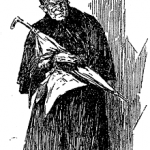Now all this time, while the tragi-comedy of life was being played in these three suburban villas, while on a commonplace stage love and humor and fears and lights and shadows were so swiftly succeeding each other, and while these three families, drifted together by fate, were shaping each other’s destinies and working out in their own fashion the strange, intricate ends of human life, there were human eyes which watched over every stage of the performance, and which were keenly critical of every actor on it. Across the road beyond the green palings and the close-cropped lawn, behind the curtains of their creeper-framed windows, sat the two old ladies, Miss Bertha and Miss Monica Williams, looking out as from a private box at all that was being enacted before them. The growing friendship of the three families, the engagement of Harold Denver with Clara Walker, the engagement of Charles Westmacott with her sister, the dangerous fascination which the widow exercised over the Doctor, the preposterous behavior of the Walker girls and the unhappiness which they had caused their father, not one of these incidents escaped the notice of the two maiden ladies. Bertha the younger had a smile or a sigh for the lovers, Monica the elder a frown or a shrug for the elders. Every night they talked over what they had seen, and their own dull, uneventful life took a warmth and a coloring from their neighbors as a blank wall reflects a beacon fire.
And now it was destined that they should experience the one keen sensation of their later years, the one memorable incident from which all future incidents should be dated.
It was on the very night which succeeded the events which have just been narrated, when suddenly into Monica William’s head, as she tossed upon her sleepless bed, there shot a thought which made her sit up with a thrill and a gasp.
“Bertha,” said she, plucking at the shoulder of her sister, “I have left the front window open.”
“No, Monica, surely not.” Bertha sat up also, and thrilled in sympathy.
“I am sure of it. You remember I had forgotten to water the pots, and then I opened the window, and Jane called me about the jam, and I have never been in the room since.”
“Good gracious, Monica, it is a mercy that we have not been murdered in our beds. There was a house broken into at Forest Hill last week. Shall we go down and shut it?”
“I dare not go down alone, dear, but if you will come with me. Put on your slippers and dressing-gown. We do not need a candle. Now, Bertha, we will go down together.”
Two little white patches moved vaguely through the darkness, the stairs creaked, the door whined, and they were at the front room window. Monica closed it gently down, and fastened the snib.
“What a beautiful moon!” said she, looking out. “We can see as clearly as if it were day. How peaceful and quiet the three houses are over yonder! It seems quite sad to see that ‘To Let’ card upon number one. I wonder how number two will like their going. For my part I could better spare that dreadful woman at number three with her short skirts and her snake. But, oh, Bertha, look! look!! look!!!” Her voice had fallen suddenly to a quivering whisper and she was pointing to the Westmacotts’ house. Her sister gave a gasp of horror, and stood with a clutch at Monica’s arm, staring in the same direction.
There was a light in the front room, a slight, wavering light such as would be given by a small candle or taper. The blind was down, but the light shone dimly through. Outside in the garden, with his figure outlined against the luminous square, there stood a man, his back to the road, his two hands upon the window ledge, and his body rather bent as though he were trying to peep in past the blind. So absolutely still and motionless was he that in spite of the moon they might well have overlooked him were it not for that tell-tale light behind.
“Good heaven!” gasped Bertha, “it is a burglar.”
But her sister set her mouth grimly and shook her head. “We shall see,” she whispered. “It may be something worse.”
Swiftly and furtively the man stood suddenly erect, and began to push the window slowly up. Then he put one knee upon the sash, glanced round to see that all was safe, and climbed over into the room. As he did so he had to push the blind aside. Then the two spectators saw where the light came from. Mrs. Westmacott was standing, as rigid as a statue, in the center of the room, with a lighted taper in her right hand. For an instant they caught a glimpse of her stern face and her white collar. Then the blind fell back into position, and the two figures disappeared from their view.
“Oh, that dreadful woman!” cried Monica. “That dreadful, dreadful woman! She was waiting for him. You saw it with your own eyes, sister Bertha!”
“Hush, dear, hush and listen!” said her more charitable companion. They pushed their own window up once more, and watched from behind the curtains.
For a long time all was silent within the house. The light still stood motionless as though Mrs. Westmacott remained rigidly in the one position, while from time to time a shadow passed in front of it to show that her midnight visitor was pacing up and down in front of her. Once they saw his outline clearly, with his hands outstretched as if in appeal or entreaty. Then suddenly there was a dull sound, a cry, the noise of a fall, the taper was extinguished, and a dark figure fled in the moonlight, rushed across the garden, and vanished amid the shrubs at the farther side.
Then only did the two old ladies understand that they had looked on whilst a tragedy had been enacted. “Help!” they cried, and “Help!” in their high, thin voices, timidly at first, but gathering volume as they went on, until the Wilderness rang with their shrieks. Lights shone in all the windows opposite, chains rattled, bars were unshot, doors opened, and out rushed friends to the rescue. Harold, with a stick; the Admiral, with his sword, his grey head and bare feet protruding from either end of a long brown ulster; finally, Doctor Walker, with a poker, all ran to the help of the Westmacotts. Their door had been already opened, and they crowded tumultuously into the front room.
Charles Westmacott, white to his lips, was kneeling an the floor, supporting his aunt’s head upon his knee. She lay outstretched, dressed in her ordinary clothes, the extinguished taper still grasped in her hand, no mark or wound upon her—pale, placid, and senseless.
“Thank God you are come, Doctor,” said Charles, looking up. “Do tell me how she is, and what I should do.”
Doctor Walker kneeled beside her, and passed his left hand over her head, while he grasped her pulse with the right.
“She has had a terrible blow,” said he. “It must have been with some blunt weapon. Here is the place behind the ear. But she is a woman of extraordinary physical powers. Her pulse is full and slow. There is no stertor. It is my belief that she is merely stunned, and that she is in no danger at all.”
“Thank God for that!”
“We must get her to bed. We shall carry her upstairs, and then I shall send my girls in to her. But who has done this?”
“Some robber,” said Charles. “You see that the window is open. She must have heard him and come down, for she was always perfectly fearless. I wish to goodness she had called me.”
“But she was dressed.”
“Sometimes she sits up very late.”
“I did sit up very late,” said a voice. She had opened her eyes, and was blinking at them in the lamplight. “A villain came in through the window and struck me with a life-preserver. You can tell the police so when they come. Also that it was a little fat man. Now, Charles, give me your arm and I shall go upstairs.”
But her spirit was greater than her strength, for, as she staggered to her feet, her head swam round, and she would have fallen again had her nephew not thrown his arms round her. They carried her upstairs among them and laid her upon the bed, where the Doctor watched beside her, while Charles went off to the police-station, and the Denvers mounted guard over the frightened maids.



